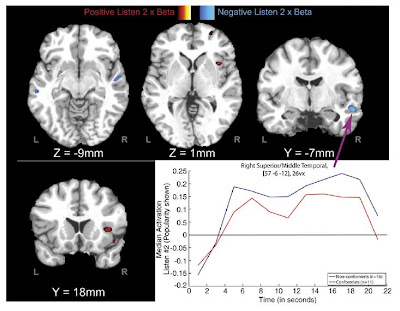
We tend to say we like what other people like. No-one wants to stand out and risk ridicule by saying they don't enjoy universally loved bands, like The Beatles... unless they're trying to fit into a subculture where everyone hates The Beatles.
But do people just pretend to like what others like, or can perceived popularity actually change musical preferences? Do The Beatles actually sound better because we know everyone loves them? An amusing Neuroimage study from Berns et al aimed to answer this question with the help of 27 American teens, an fMRI scanner, and MySpace.
The teens were played 15 second clips of music, and had to rate each one a 5 star scale of quality. Before the experiment they listed their preferred musical genres, and they were only given music from genres they liked. To make sure no-one had heard the songs before, the researchers went on MySpace and found unsigned artists...
A total of 20 songs were downloaded in each of the following genres: Rock, Country, Alternative/Emo/Indie, Hip-Hop/Rap, Jazz/Blues, and Metal (identified by the MySpace category).The twist was that each song was played twice: the first time with no information about its popularity, and then again, either with or without a 5 star popularity score shown on the screen. Cleverly, this was based on the number of MySpace downloads. This meant that the subjects had a chance to change their rating based on what they'd just learned about the song's popularity.
What happened? Compared to doing nothing, hearing music activated large chunks of the brain, which is not very surprising. In some areas, activity correlated with how highly the listener rated the song:
The regions showing activity correlated with likability were largely distinct from the auditory network and were restricted to bilateral caudate nuclei, and right lateral prefrontal cortices (middle and inferior gyri). Negative correlations with likability were observed in bilateral supramarginal gyri, left insula, and several small frontal regions.The headline result is that a song's popularity did not correlate with activity in this "liking music network", and nor did activity in these areas correlate with each teen's individual "conformism" score, i.e. how willing they were to change their ratings in response to learning about the song's popularity. Berns et al interpreted this as meaning that, in this experiment, popularity did not affect whether the volunteers really enjoyed the songs or not.
Instead, activity in some other areas was associated with conformism:
we found a positive interaction in bilateral anterior insula, ACC/SMA, and frontal poles. Given the known roles of the anterior insula and ACC in the cortical pain matrix, this suggests that feelings of anxiety accompanied the act of conforming....Interestingly, the negative interaction revealed significant differences in the middle temporal gyrus... the popularity sensitive individuals showed significantly less activation. This suggests that sensitivity to popularity is also linked to less active listening.

But there's still an element of this here: the authors suggest that conformism is motivated by anxiety, not because anyone reported suffering anxiety, but purely because it was associated with activity in the anterior insula etc. This is putting a lot of faith in the idea that anterior insula etc activity means anxiety - it could mean a lot of other things. There's also the question of whether letting people rate the songs for the first time before telling them about the popularity is the best way of measuring social pressures.
The most serious omission in this study, however, is that we're not told about the correlations between music preference and conformism. The world needs to know: are kids who like "Alternative/Emo/Indie" music free-thinkers, or are they really the biggest conformists of all? The paper doesn't tell us. In the absence of empirical evidence, we'll have to rely on South Park...
Stan: But if life is only pain, then...what's the point of living?
Fringe-flicking Goth: Just to make life more miserable for the conformists. (flicks fringe)
Stan: Alright, so how do I join you?
Goth Leader: If you wanna be one of the non-conformists, all you have to do is dress just like us and listen to the same music we do.
- South Park, "Raisins"



 07.40
07.40
 wsn
wsn
 Posted in
Posted in
No Response to "The Neuroscience of MySpace"
Posting Komentar